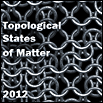Speaker
Timo Hyart
(Leipzig University)
Description
The competition between Kitaev and Heisenberg
interactions away from half filling is studied for the doped
Kitaev-Heisenberg $t$-$J_K$-$J_H$ model on a
honeycomb lattice. While the isotropic Heisenberg coupling
supports a time-reversal violating d-wave singlet state, we
find that the Kitaev interaction favors a time-reversal
invariant p-wave superconducting phase, which obeys the
rotational symmetries of the microscopic model, and is
robust for $J_H<J_K/2$. Within the p-wave
superconducting phase, a critical chemical potential
$|\mu|=\mu_c \approx t$ separates a topologically trivial
phase for $|\mu|< \mu_c$ from a topologically non-trivial
$Z_2$ time-reversal invariant spin-triplet phase for
$|\mu|>\mu_c$.
Because the topological p-wave superconductivity in the
doped Kitaev model is considerably more robust to adding a
Heisenberg exchange than the Kitaev spin liquid phase itself
at zero doping, we expect that this type of physics might be
observable in doped honeycomb iridates, in particular in
Li$_2$IrO$_3$.

